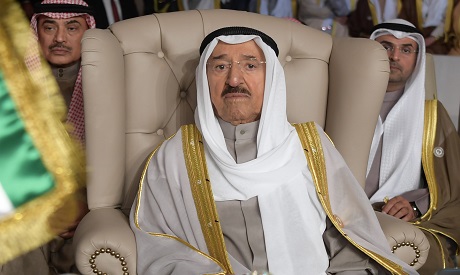
In this March 31, 2019 file photo, Kuwait's ruling emir, Sheikh Sabah Al Ahmad Al Sabah, attends the opening of the 30th Arab Summit, in Tunis, Tunisia AP
Kuwait's Emir Sheikh Sabah Al-Ahmad Al-Jaber Al-Sabah died at the age of 91 on Tuesday after a struggle with illness.
Sheikh Sabah had recently received medical treatment in the United States after undergoing surgery.
He was temporarily replaced during his illness by Crown Prince Sheikh Nawaf Al-Ahmad Al-Jaber Al-Sabah.
Sheikh Sabah became the Gulf country’s emir in 2006 after a history of serving in key state positions, including as prime minister and foreign minister for four decades.
His tenure as emir witnessed the adoption of a number of political and socio-economic reforms.
In 2005, Sabah's government involved unprecedented representation for women following the appointment of Maasuma Al-Mubarak, liberal political scientist and women's rights activist, as planning minister and minister for administrative development affairs.
"I am proud of this great confidence the prime minister has shown in me. I hope I will succeed in my mission," Maasuma said at the time. This step coincided with the appointment of two women, Sheikha Fatima Nasser Al-Sabah and Fawziya Al-Bahar, to Kuwait's 16-member municipal council.
Moreover, the Kuwait Direct Investment Promotion Authority (KDIPA) offered investment incentives in a bid to diversify sources of economic revenues.
This included tax holidays and full ownership and control of businesses by foreign investors. Ownership restrictions remained in a limited number of sectors, including those related to security and natural resources.
Politically, during Sabah's years as emir, the parliament served as a key actor in Kuwaiti politics.
In terms of foreign policy, Sheikh Sabah adopted a mediatory foreign policy strategy, playing a major role in a number of regional conflicts and political crises.
He exerted efforts to end the diplomatic rift between Arab states following the 2017 decision by Egypt, Saudi Arabia, the United Arab Emirates (UAE) and Bahrain to boycott Qatar, whom they accused of supporting terrorist groups.
"I am sure that all Gulf states see the GCC role as important for them, for the region and the world. This is what we should build on it and use as common ground for moving ahead to bridge the gap," Kuwaiti premier Sheikh Sabah Al-Khaled said in June.
Furthermore, under Sabah's rule, Kuwait hosted talks between parties to the Yemeni conflict, urging them to “turn war into peace and backwardness into development.”
On 18 September, US President Donald Trump awarded the Legion of Merit to Sheikh Sabah for his "tireless mediation of disputes" in the region.
“A leader in the Middle East for decades, the emir has been a truly unwavering friend and partner to the United States,” a White House statement said at the time. “The emir is also an unparalleled diplomat, having served as his nation’s foreign minister for 40 years. His tireless mediation of disputes in the Middle East has bridged divides under the most challenging circumstances.”
Following recent Arab normalisation agreements with Israel, however, Kuwait said it "will be the last country to normalise relations with Israel," demanding the finalisation of a "fair and comprehensive solution to the Palestinian issue" and the establishment of a Palestinian state with East Jerusalem as its capital based on the 2002 Arab peace iniative.
Short link: